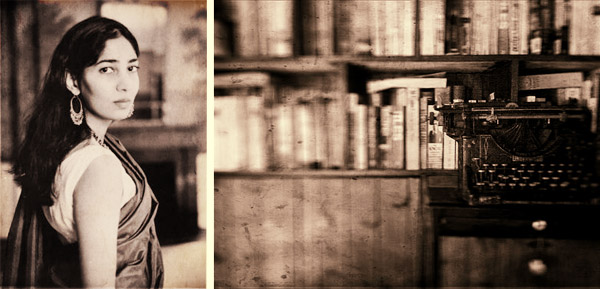GIPCA – Great Texts with Kiran Desai, 20 September 2012, Hiddingh Hall
ROSA LYSTER

Kiran Desai was the guest author speaking at GIPCA’s Great Texts series. She’s won the Booker Prize (2006), and her books (Hullabaloo in the Guava Orchard and The Inheritance of Loss) are passionately loved by readers, passed on and recommended. She’s a captivating public speaker. But still, it could have been a bit of a disaster. The way it normally works is that the author does a reading, and then someone (such as Imraan Coovadia, novelist and professor at UCT) asks them thoughtfully phrased questions to open a discussion, which is then continued by the audience. That’s the usual format, and everyone seems to like it.
This time though, Coovadia handed over questioning to four of his postgraduate students, three from the Creative Writing programme and one from English Lit. As he introduced Desai to the excited audience, he also mentioned that the four questioners were a bit edgy about the whole thing. I think his exact words were “incredibly nervous”. I can attest to the truth of this, because I was one of those questioners. And we were all terrified. Sitting on a stage next to a Booker Prize-winner, someone whose work you love, and trying to muster up the courage to ask her a question while you are holding the microphone way too close to your mouth, is a uniquely daunting experience. The four of us could all have come apart at the seams.
So it could have been a disaster, but as anyone who was there will confirm, it turned out pretty great. And that’s because Desai was wonderful. She took our anxiously phrased questions and made them seem much more interesting than they were, using them as launch-pads to talk about her life as a writer, the life of her characters, and the way she expresses the things that matter to her. Desai speaks in the way she writes, with elegance and wit. Her novels temper a deep seriousness about the world with a lightness of touch and a kind of levity, and she struck that same balance as she addressed this event's audience.
She spoke for a while about her mother (the novelist Anita Desai), and what it was like to grow up in a writer’s house, with books all around her. She spoke about the novels she loved when growing up (a charmingly expansive list, which stretched to include adventure stories and the great Russians), and about her belief in what books can do (everything). She spoke about her titles and how she feels about them now (Hullabaloo in the Guava Orchard = bad, Inheritance of Loss = good). All of her answers were long, detailed and thoughtful, except for one. She was asked whether or not she ever restrains herself, curbs her writing in order to accommodate her readers? Her answer? “No”. That was it. Unsaid was that she doesn’t do it because she doesn’t have to.
She spoke about her characters the way you hope all writers will, but hardly ever do: with affection, with fascination, and with the sense that they are almost alive. At times, she said, they carried her away as they slipped almost out of her control. She spoke in particular about the judge in Inheritance, an incredibly complex and deeply rendered character based on her grandfather. She wrote about him, she said, because it was the best way she knew to make sense of him, to try and understand what he was like. In writing the man down, she began to comprehend him. Her novels, especially Inheritance, make sense of the world for her readers in the same way.
 SLiPStellenbosch Literary Project
SLiPStellenbosch Literary Project
For any writer – let alone a graduate student – this is a smart, elegant piece of composition, Rosa.